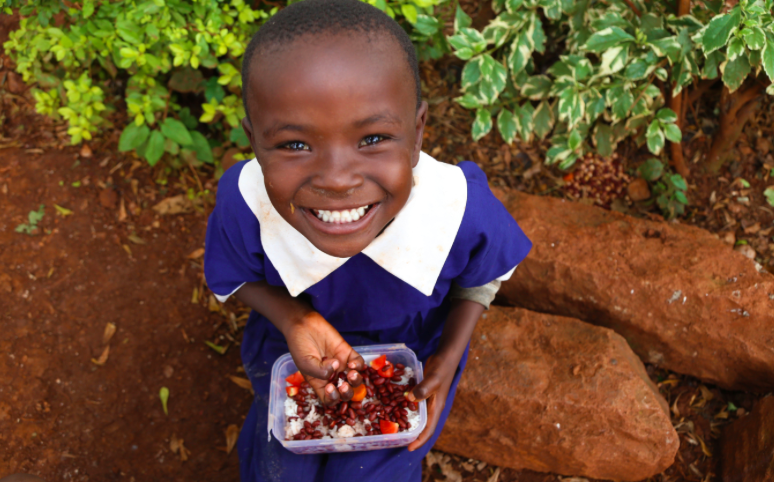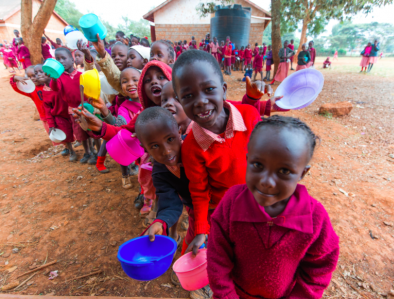Share this
Meet Wawira Njiru, Founder Of Food For Education
“A hungry child can’t learn.”
Wawira Njiru is a Kenyan businesswoman, entrepreneur, human nutritionist, and philanthropist, who serves as the executive director of Food 4 Education, an organization that cooks, prepares and distributes nutritious meals, at subsidized prices to over 2,000 poor school children in Ruiru, a suburb of Nairobi, the capital city of Kenya.
At the inception of Food 4 Education in 2011, the initiative provided subsidised lunch to 25 children from underprivileged backgrounds in Ruiru. Through online campaigns to raise money to fund her project, Wawira was able to stay the course.
Fast forward to 2019 and the initiative now feeds more than 3,000 schoolchildren every day and employs 30 people including cooks and drivers. This is also Wawira’s fulltime job. She serves as the executive director.
Wawira Njiru witnessed two different versions of Kenya during her childhood. The first version, of which she was a part, featured relative comfort, plenty of meals, access to health care, and good education.
The second version generally involved the opposite and she witnessed it all around her as she grew up.
Now Njiru is working to end the disparities between the different worlds through Food for Education, the simply named school lunch organization that provides subsidized and highly nutritious meals to schools around the country.
Thank you @PeopleDailyKe.
Proud of @Food4Education and our team’s work #FeedingTheFuture.
Thankful for all Kenyans who continue to stand up for our country.#MashujaaDay pic.twitter.com/Tr6k49JZVX— Wawira Njiru (@wawiranjiru) October 20, 2020
Her ambition, simplicity of mission, and proof of impact has earned Njiru the first-ever Global Citizen Prize for Youth Leadership presented by Cisco, awarded at the Global Citizen Festival: Mandela 100, presented and hosted by the Motsepe Foundation, on Dec. 2 in Johannesburg.
“I am feeding the future of Africa because I believe in a generation that is well-nourished and educated,” Njiru said. “Hungry children cannot learn and I believe a prosperous future for my continent begins with no child is learning on an empty stomach.”
The prize entails $250,000 for Food for Education, an all-inclusive round-trip to Johannesburg to attend the Prize Ceremony at the Global Citizen Mandela 100 Festival, as well as networking and development opportunities to support the organization’s work.
How It Started
Food for Education
In Kenya, more than 36.7% of the population lives in extreme poverty, on less than a $1.90 per day.
Njiru noticed that children were often the most affected by poverty. Throughout the country, more than 29% of children in rural areas and 20% in urban areas suffer from malnutrition, which often causes stunting, or lifelong physical and mental deficiencies. More than 23 million Kenyan children go to school hungry every day and 51% of the country is food insecure.
She realized that a lack of food and nutrition made learning in the classroom difficult, which creates a profoundly unequal education system, and that addressing this gap could vastly improve educational outcomes.
Read More: Kenya Will Give Free Menstrual Pads to Girls
“A hungry child can’t learn,” she told Global Citizen. ”When they’re not able to get the right nutrition, they’re not able to concentrate, they become irritable.”
When she went to the University of South Australia, she majored in food sciences and deepened her understanding of the link between food and education. Afterwards, she returned to Kenya and decided to work on closing the educational gap in the country by making sure kids had enough to eat.
That’s when she started Food for Education, which has served 400,000 meals to date, and currently provides food to 2,000 students per day. In three years, Njiru wants to serve 100,000 students per day, a 50-fold increase and the Global Citizen Prize for Youth Leadership allows her to dramatically scale her efforts.
How Food for Education Works
 Food for Education
Food for Education
While Kenya has removed many of the financial barriers to school, Njiru said the country has yet to address the nutritional barriers. Even though more kids are going to school than in the past, they’re often not able to get a quality education because of chronic hunger.
Food for Education fills this gap with a streamlined, cost-effective system.
“We use a central production facility and a hub-and-spoke model,” Njiru said. “We source directly from farmers who are partners, prepare it in our kitchen, and deliver it to schools.”





















